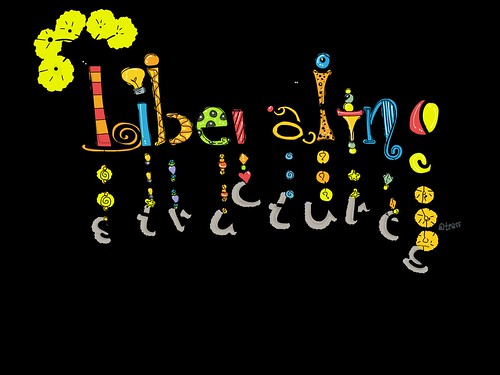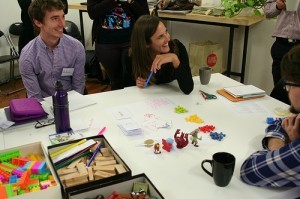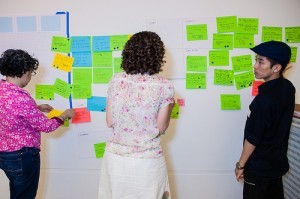Dec 2023: Eeeks, I haven’t updated this page in about 10 years! I’ll get around to that eventually!!
This section of my portfolio lists some of my facilitation activities; I have divided these into Facilitative Teaching and Facilitation.
Facilitative Teaching
In my educational developer role, I have the pleasure of facilitating a variety of workshops. As a workshop facilitator, I generally take on the role of facilitative teaching. In facilitative teaching, the “teacher” has the content knowledge that she wants learners to know (or the behaviours she wishes to help the learners change). She recognizes this but assumes she is not the only expert in the room; therefore, she uses the learners ideas and experience in her teaching. In facilitative teaching, the teacher guides the learning by presenting complex problems, cases, projects, or situations in order to help learners construct meaning and come to an understanding of important ideas and processes (Wiggins & McTighe, 2007; Nelson, 2009).
Workshops I have facilitated include (in alphabetical order):
- Classroom Assessment Techniques: This 1-2 hour session focuses on helping instructors learn about, and design, formative assessment methods.
- Developing Your Skills as Peer Reviewer of Teaching: a four-hour experiential workshop to help individual gain skills and knowledge applicable in peer review of teaching situations. Participants are instructors and teaching assistants who come from different Faculties across UBC; we have also been invited to offer the workshop at the University of Northern BC and Douglas College. Co-facilitated with CTLT colleagues many times since 2009.
- Educational Developers Portfolio: In 2016, Judy Chan and I co-facilitated a webinar titled “The Educational Developers Portfolio: Possibilities, Purposes and Preparation” for the Educational Developers’ Caucus. In 2017, I collaborated with Drs. Dawson, McDonald, and Chan to co-design and co-facilitate the first EDC Institute on the Educational Developers portfolio (see here, in “Past Institute” section)
- Effective Team Presentations: a 1.5 hour workshop for graduate students who are working, in teams, to create and make a team presentation.
- Feedback-related Workshops: I have facilitated a number of workshops on giving and receiving feedback. Some of these were short workshops for graduate students. Others included:
- Feedback workshop for PharmD students: This workshop is geared at enhancing feedback communication between PharmD students and their preceptors. The workshop activities engage the students in role-playing, brainstorming, discussion and script writing. Co-facilitated with Gary Poole since 2010. For photos and lesson plan, see here.
- Feedback workshop for preceptors (of PharmD students and Residents): Workshop aimed at enhancing preceptors’ abilities to give and respond to feedback from students in the PharmD program or Residents. Offered November 22, 2013 (co-facilitated with Gary Poole, 3 hours).
- For New Educational Developers: Full-day workshop offered at the Festival of Learning in 2016. Co-facilitated with: Jennifer Jasper (Justice Institute of BC) and Eric Kristensen (Retired educational developer).
- Instructional Skills Workshops (see here).
- Learning Outcomes: a 1-3 hour session designed to teach learning outcomes basics.
- Learner-Centered Syllabus: 1-3 hour session designed to help instructors develop a learner-centered syllabus.
- Peer Coaching for Graduate Students: a half day workshop for graduate students interested in building their skills as peer coaches.
- Presentation Skills Workshop for Graduate Students: a 2-day workshop geared at enhancing presentation skills.
- Reflecting on Feedback on your Teaching: a 3-hour workshop on the use of reflection and feedback to improve teaching.
- TA Mentorship: a full day workshop for graduate students who are coordinating TA (teaching) mentorship programs in their departments and mentoring graduate students on teaching. Co-facilitated with Joseph Topornycky. (Workshop offered twice in August 2011 and again in September 2012).
Facilitation
“Group facilitation is a process in which a person, whose selection is acceptable to all members of the group, is substantively neutral, and has no decision-making authority, diagnoses and intervenes to help a group improve how it identifies and solves problems and makes decisions, to increase the group’s effectiveness.” – Roger Schwarz
I distinguish facilitation from facilitative teaching because, in the latter, the facilitator has content expertise and purposefully works with learners to help them come to an understanding of specific and important ideas and processes.
Below, in reverse chronological order, are sessions I facilitated:
- Characteristics of the Ideal Graduate. As part of an overall curriculum renewal process, Allyson Rayner and I co-facilitated a 3-hour working session with course co-ordinators and section leads from the Bachelor of Medical Laboratory Sciences, to help them articulate about characteristics of the ideal graduate. March 4, 2016.
- Communication Skills for Health Science Professionals. On October 20, 2014, I was part of a facilitation team for a wonderful event for Audiology and Speech Language Pathology students. This event involved professional actors who were acting out complex scenarios in which communication played a central piece. Students interacted with the actors in these situations. My role was to facilitate the process, including the debrief.
- Strategic Planning for OESD (Mission, Vision, Values). In May, 2013, I facilitated the development of a new mission statement for the OESD. This process continued–slowly–until I left the OESD in April 2015.
- Cross-Professionals Collaboration. (Centre for Health Education Scholarship). In July, 2013, I facilitated an Historical Scan and Focused Conversation for seven members of a committee who had been working on a cross-professionals initiative for a number of years. The purpose of the session was to reflect on what the group had learned so far and begin to plan for the future (this latter part was facilitated by Deborah Butler). Deb, Glenn Regehr, Sarah Dobson and I worked closely together to plan this session.
- Curriculum Retreat for new Entry to Practice PharmD Program. (Pharmaceutical Sciences). On June 20, 2013, Janice Johnson and I co-facilitated a curriculum retreat for the Faculty to assist members (approximately 60 participated) learn more about, and contribute their ideas to, the development of the new Entry-to-Practice PharmD program.
Photo credit: The colors of autumn by Susanne Nilsson (CC BY)



